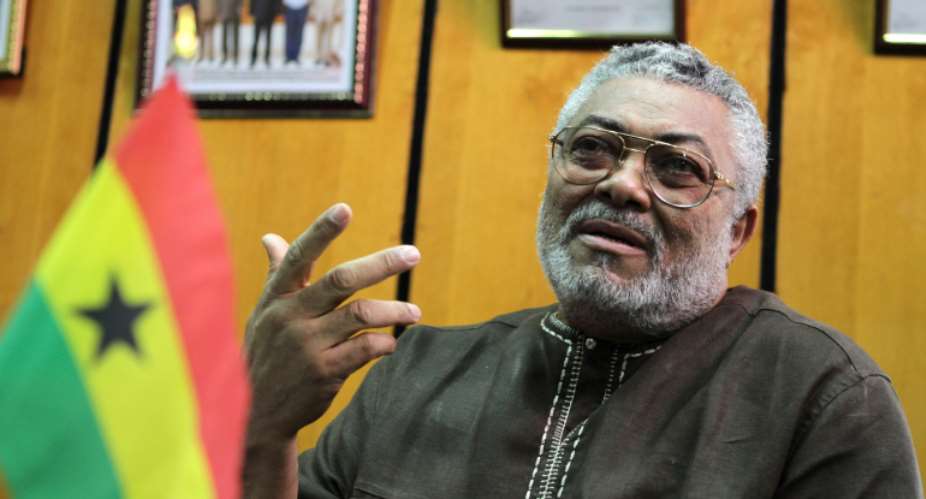A week after his death, President Rawlings, as he did in life, continues to generate divergent opinions about his legacy.
While he has been praised by many, he has also been condemned. Amongst those condemnations have been statements by survivors of some of those who were killed in the revolutions. Surprisingly, some have expressed anger at the victimized families for recounting their pain at this time. These attacks on those mourning the victims of Mr. Rawlings are unfair, unafrican and unchristian. One cannot, as the Akans say, beat a person and then bar them from crying. President Rawlings, in his characteristic candour, would have said, "Etua wo yonko a, etua dua!". Let them mourn!
Those displeased with the expression of disapproval cite Mr. Rawlings' status as an ex-president and our reverence for the dead. While those are valid points, Mr. Rawlings himself was not constrained by such niceties while dealing with the deaths of his predecessors.
We must honour him because how we treat him says more about us than about him.
In doing so, however, we must be careful, not to distort history or send the Gods the unintended message that we desire more Rawlingses-- because we will get more of what we celebrate. It is distressing that so many are eagerly rewriting our history to honour him. For example, the Washington Post which had forthrightly condemned the murder of Jamal Khashoggi by Saudi Arabia and demanded sanctions against the Crown Prince, reported that Mr. Rawlings, who killed many had a "complicated legacy".
Despite the divided opinion, Mr. Rawlings himself had a clear view of the evil he had wrought by inserting indemnity clauses into the 1992 constitution. If he expected to be celebrated, why was he, an apostle of accountability, protecting himself? The insertion of those indemnity clauses in the 1992 constitution suggests that like General Afrifa, Mr. Rawlings worried about retribution from a future generation of coup-makers.
As a nation though, we must answer the question-- Was it worth it?
We know the cost-- the murders, the imprisonment, the torture, the exiles, the destroyed businesses and the curfew years.
- Is Ghana more accountable now?
- Is corruption any less?
- Do we have better governance?
A nation speaks to its unborn by what it celebrates and honours.
That is why in 1661, after the restoration of Charles II, on the anniversary of the regicide, a corpse believed to be Cromwell was exhumed and hung. Of course, we being better than the English, would recoil at such barbarity.
It bears noting that the Americans do not celebrate Justice Taney and President Davis for defending slavery-- they celebrate Lincoln who freed the slaves.
The British do not celebrate Neville Chamberlain for almost losing Britain-- they celebrate Churchill for his wartime leadership.
South Africans do not celebrate the architects of apartheid who murdered Biko-- they celebrate Mandela and those who ended apartheid.
Nigerians do not celebrate Abacha-- they celebrate Abiola.
Brazil does not celebrate the team that lost 7-1 to Germany-- it celebrates Pele and the teams that won the world cups.
And Kotoko does not celebrate the team that lost to Kadiogo-- it celebrates the teams the won them continental honours.
Finally, to the President, you are right to bury Mr. Rawlings in dignity but you have one more task, which is even more important.
Mr President, on our behalf, apologize to his victims-- to the widows, widowers and orphans of the dead-- to those who were tortured, imprisoned, exiled or financially destroyed, in the name of the so-called revolutions. That apology will help bury the evil that Mr Rawlings did, let the good live on and restore trust in our motto, "FREEDOM AND JUSTICE"
May God bless Ghana.
Arthur Kobina Kennedy (19th November, 2020)





 We’ll no longer tolerate your empty, unwarranted attacks – TUC blasts Prof Adei
We’ll no longer tolerate your empty, unwarranted attacks – TUC blasts Prof Adei
 Bawumia donates GHc200,000 to support Madina fire victims
Bawumia donates GHc200,000 to support Madina fire victims
 IMF to disburse US$360million third tranche to Ghana without creditors MoU
IMF to disburse US$360million third tranche to Ghana without creditors MoU
 Truck owner share insights into train collision incident
Truck owner share insights into train collision incident
 Paramount chief of Bassare Traditional Area passes on
Paramount chief of Bassare Traditional Area passes on
 Two teachers in court over alleged illegal possession of BECE papers
Two teachers in court over alleged illegal possession of BECE papers
 Sunyani: Victim allegedly shot by traditional warriors appeals for justice
Sunyani: Victim allegedly shot by traditional warriors appeals for justice
 Mahama vows to scrap teacher licensure exams, review Free SHS policy
Mahama vows to scrap teacher licensure exams, review Free SHS policy
 Government will replace burnt Madina shops with a new three-story, 120-store fac...
Government will replace burnt Madina shops with a new three-story, 120-store fac...
